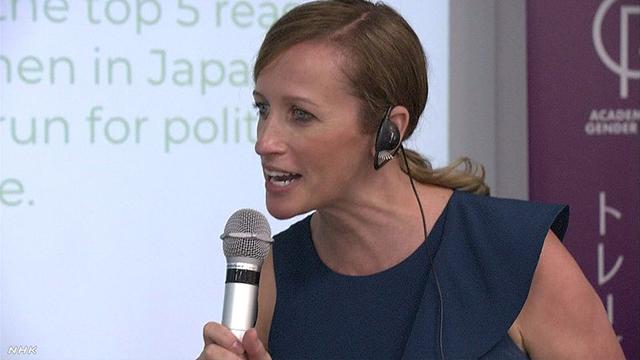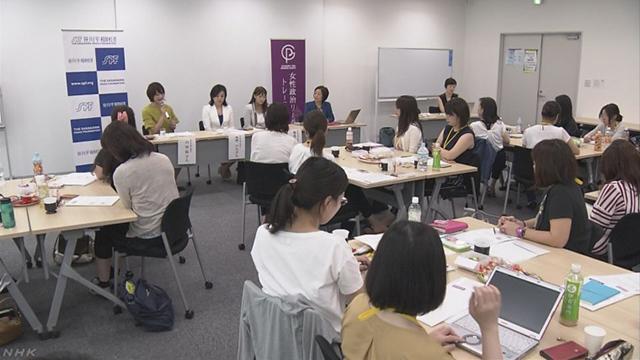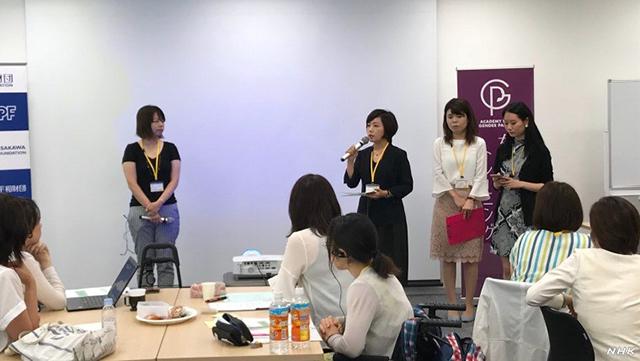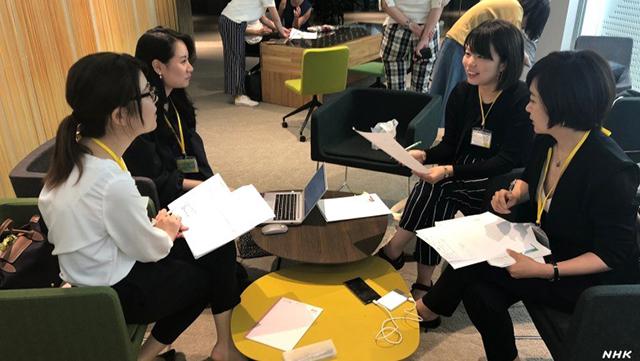Encouraging women to enter politics
I'm a 39-year-old political reporter and mother. I go home at around 5:30 PM every day. But I couldn't imagine this work style before giving birth, because I was taught that reporters are expected to work until late at night or early in the morning to get a scoop, and of course, that's what I had been doing.
A leaflet recently caught my eye. It was about a training session for women aspiring to become politicians. "Become a lawmaker and change society!" it said. Curious about the kind of women who take part and what they hope to achieve, I applied.
Day One: Friday, July 13th, 2018
Want to become a politician?
The training session started on a Friday and lasted 3 days. I decided over a month before that I would participate, and I asked my husband to keep his schedule open on those days to look after our child.
The session was held at a hotel in Tokyo. On my way to the venue, I wondered whether I would be able to keep up with the other participants. I assumed that they would all be very motivated and have impressive careers.
The 28 participants varied in age from their teens to their 40s, as did their motives for joining.
One woman said, "I decided to take part in the training to make sure I really want to run in a local election next year."
An 18-year-old said, "I want to help change my community as it is struggling to hold its regional festivals."
Another woman said, "I want to know what other women think of the workplace environment. Female workers make up only 10% of the workforce at my company."
Some participants revealed that they are single mothers, and others said they are part of the LGBT, or lesbian, gay, bisexual and transgender community.

The importance of taking risks
The lecturers were two women from the United States: Kristin Haffert, an expert in leadership training for women, and Jessica Grounds, who has supported numerous female politicians in their election campaigns, including Hillary Clinton.
Their opening speech shocked me. "We have a message for women who aren't interested in running for office. Many women tend to avoid putting themselves in the spotlight. They don't want to disclose private details about their lives. Unlike men, women are scrutinized about everything from their hairstyles to their choice of clothing. But we insist that no woman will be rewarded unless she is ready to take risks," they said.

Day Two: Saturday, July 14th, 2018
Common barriers for women everywhere
Day 2 opened with a question. The lecturers asked us to give 5 reasons Japanese women choose not to run in an election.
One participant answered, "In Japan, women are expected to be demure."
Another participant pointed out, "I think it is often difficult for women to gain understanding from their families."
I thought, "Women with careers and families are too busy." A single mother said, "I don't want to risk having my child criticized or bullied."
The two lecturers responded. "We asked the same question in America, Asia and Africa, and got the same answers. We believe that women throughout the world have the same mindset, and that is what we need to change. You all have the power to do so."
I was stunned to hear the answers were the same throughout the world.
Experiences of female politicians
Next, we listened to the experiences of Japanese female politicians -- three women in local legislatures.
Yuka Shinohara from Akishima City, Tokyo, says that while giving speeches alone at one of her political activities, people would come up to her and complain without even listening to what she said. Now, as an assembly member, she is harassed with questions such as "Why don't you marry?" and "Aren't you going to have a kid?"--behavior which would normally constitute sexual harassment.
Hiroko Nagano from Toshima Ward, Tokyo, decided to run after being encouraged by lawmakers whom she met through work. She had expected her new workplace to be understanding toward women, but she was wrong. Her colleagues at the assembly started behaving differently after she returned from giving birth. She said she ignored their behavior, but realized that anything beyond the established rules was frowned upon at the legislature.
One day, when meetings went on until late evening, she brought her baby to a meeting room in the assembly for nursing. This led to the establishment of a special breastfeeding room within the public buildings of Toshima Ward.
Yuko Yamada is from Koshigaya City, Saitama Prefecture, north of Tokyo. She became concerned about food safety after the 2011 earthquake and nuclear accident in northeastern Japan. That prompted her to start sitting in on assembly meetings, and made her believe that most assembly members knew nearly nothing about food and its safety. That was why she ran for the Koshigaya City assembly.
Today, she is sometimes criticized for working hard despite having kids, and she feels bad. But she thinks her job is worth doing because it involves tackling issues that trouble her daily life. She said, "I didn't know how tough yet enjoyable it is to be an assemblyperson."
Their stories were all very moving.
The work of politicians is not to realize their personal ideologies
Other female politicians shared their experiences through videos. I should have known all about them, since I was in charge of covering Japanese politics. But I had forgotten over the years.
They said, "The work of politicians is not to try to realize their personal ideologies. What we need to do is to listen carefully to what the public wants and work together to fulfill them."
Listening to others is what politicians are required to do. But, to be honest, I only witnessed it a few times during my daily coverage of lawmakers.
Those who appeared in the video said, "Women are great at gathering information, as the so-called 'mama-tomo networks' show." Such networks are formed by mothers of children who go to the same school and aim to transmit information. They also said, "Local assemblies usually have fixed schedules, which makes it relatively easy to balance work and family life."
Their comments made me realize that much of the work of local politicians consisted of listening to the challenges the public face in their daily lives and trying to solve them.
This was quite different from the national politics which I used to cover, and it helped me understand why women could excel in local politics.
After watching the videos, some of the participants said, "I think I can do this", "I was surprised to learn that local assemblies are suited to women."
But in reality, 20% of local assemblies in Japan do not have even a single female member. And women make up only 10% of the Lower House of the Diet. This contributes to Japan's rank as 158 out of 193 nations in women's participation in politics.
Despite these statistics, learning that the work of a politician is to help solve problems that people encounter in their daily lives made me think women are suited to the job.

No need to be talkative
That being said, you can't become a politician unless you can reach voters. In the latter half of day 2, we learned how to write a 2-minute election speech.
A speech written by a woman who worked for a construction company for 8 years went like this: "My colleagues always ask me whether I am going to remain in the company after I get married. Male bosses do not call me by my name. They refer to me as 'that tall young girl' or something of that sort. In the past, I thought this kind of treatment was normal, but I now realize it's not. I want both men and women to realize this too. That's why I've decided to run in this election.”
She wasn't a skilled speaker, but some of the participants said they liked her speech. They said her shyness helped add sincerity to her message. I agreed with them. An awkwardly-given speech from the heart is more powerful than an artificial one given by a polished speaker.
My speech went like this: "We face a lot of problems, such as difficulties with work style, child rearing, and wage gaps. The fundamental problem behind these issues is gender inequality. I believe society would become a better place to live if people would be more open to diversity."
I did not have a chance to give my speech, and I can't say it had the power to touch the audience. Giving an election speech is quite different from reporting in front of a TV camera, or giving commentary. You need special skills.
It was quite a challenge to improve speech-writing skills during such a short training session.
Day 3: Sunday, July 15th, 2018
Common barriers for women everywhere
On the final day, we learned how to run in an election.
The participants were divided into groups of four. The members of each group were named candidate, general manager, communications manager, and money-raising manager. Each team worked on its own strategy under the assumption that the candidate was running for a local assembly, and presented it to the other groups.
I was the communications manager of my team. The role of candidate was given to a woman who was preparing to open a cooking class. The general manager role was given to an aide of an actual Diet member. The money-raising manager was played by a student at the University of Tokyo who returned to Japan a few years ago after having lived in Singapore for a long time. Our candidate was supposedly running for office in Ibaraki City, Osaka Prefecture.
We started work the night before the assignment was to begin, meaning the night of day 2.
First, we looked at the age distribution of Ibaraki City's assembly members, and found that very few of them were in their 20s and 30s. So we decided to appeal to the need to reflect the voices of the younger generation.
Next, we studied their demographic composition. We then learned that Ibaraki City is a bedroom community for people who work in Osaka City, that it has universities, and that it has a greater number of young adults aged 64 or younger than the prefecture's average. So, we decided to focus on families with small children.
As northern Osaka was recently hit by a powerful quake, we called for devising anti-disaster measures from a woman's point of view, making it a key pillar of our appeals.
We presented our ideas to the other groups, but we couldn't make it to the top.

First place went to a team that was fielding a candidate for the Miyazaki City assembly election. The team consisted of members from the LGBT community.
I was perplexed when a team member started her speech by declaring she has absolutely no connection with Miyazaki City. But she went on to say, "Data shows the city offers many opportunities and places 10th in a global ranking of areas where people find it easy to launch a business. But let's aim for number one. Flexibility and acceptance of people like me is vital to achieve that. Let's join hands to create a city where people from the LGBT community, women, the young and old, and those with disabilities can live together happily."
The team's slogan was "Challenge City Number 1," and I was impressed to find its members even made a poster.
Is becoming a politician the answer?
Before I started the training session, a question came to mind. I thought, if the ultimate goal is to increase the number of female politicians, shouldn't we each consider strategies to win an election?
But I realized my view could be wrong after hearing from one of the participants. She said that after thinking about an election strategy as a campaign staff member, she found there are things she could do even if she wasn't the one running.
Various people play a range of roles in an election. Some staff members have policies they hope to see realized, and they entrust candidates to carry them out. That's one way women's perspectives are reflected in the policies.
Above all, it's important to consider the process of becoming a politician. There are many cases in which staff members at lawmakers' offices and people doing work related to the Diet were encouraged to run. So first and foremost, it might be necessary to encourage more women to get involved in elections as campaign staff, for instance.
Becoming a politician might not even be the answer. The most important thing could be to gain a wider perspective.

No role model
In May, Japanese lawmakers unanimously approved legislation to increase the number of female legislators, the first of its kind.
But both the ruling and opposition parties are slow in acting. Unified local elections and the Upper House race are scheduled to be held next year. It's important to keep an eye on whether each party is really committed to sending more women to assemblies and the Diet.
Frankly speaking, I hesitated to write this article because I worried people might think it's just another story on the role of women by a female reporter.
When I cover Japanese politics, I have noticed there are policies or bills approved by lawmakers despite low public support. And some issues are not fully discussed despite growing public calls to do so. The controversy over whether to allow couples to have separate surnames is an example.
I believe this runs counter to what I've confirmed during this session--that the job of a politician is not to realize his or her ideals, but to listen carefully to the public's needs and work together to fulfill them.
There's no time to hesitate. Lawmakers from various parts of Japan who offered video messages for the training session all stressed that they didn't have a role model. We can't change anything unless we venture into the unknown.

